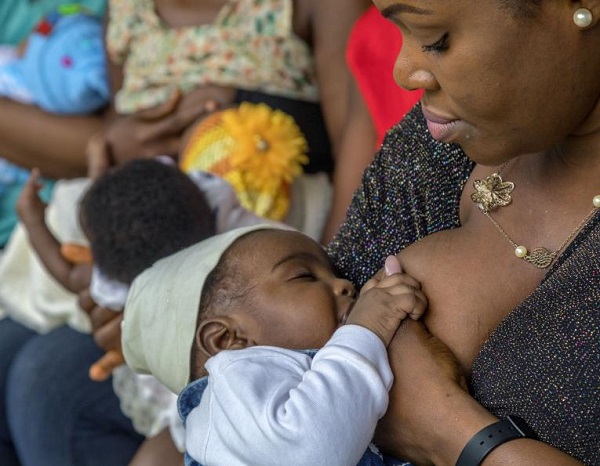
The Federal Ministry of Health (FMOH) has advocated for human breast milk as the only biologically normal way to feed babies and called on mothers to desist from feeding their newborns the ‘first milk’ called ‘colostrum’.
The director, family health, FMoH, Dr. Salma Kolo made the call at a media parley on severe acute malnutrition (SAM) organised by the International Society for Media in Public Health (ISMPH) in Abuja.
“It is made in small amounts and is a rich source of immune protective factors and developmental factors. It’s perfect for whatever gestational age a baby is born. If your baby is premature, it will give them extra protection.
“Breastmilk changes to meet the needs of your child. It continues to provide excellent nutrition, immune and other health and emotional benefits for whatever age your child is,” she explained.
Kolo stressed the alarmingly high number of children under five years of age who were suffering from the physical consequences of poor diets and a food system that is failing them across the country.
She said that far too many children were eating too little healthy food and too much unhealthy food.
“Across the country, stunting, wasting and obesity affect the same communities, sometimes the same household. For many families living in poverty, daily nutritious meals remain either unaffordable or inaccessible,” she said.
She warned that poor eating and feeding practices start from the earliest days of a child’s life.
“Though breastfeeding can save lives, an increasing number of children are fed infant formula. Then, as children begin transitioning to ‘soft’ or solid foods around six months, too many children are introduced to the wrong kind of diet,” she explained.
She said that improving child nutrition is key to preventing stunting and poor productivity later in life.
“This requires a multi-sectoral approach and collaboration from stakeholders in the public and private sectors, as childhood malnutrition is inextricably linked to multidimensional poverty.
“Hence, intervention to address malnutrition must be multidimensional and requires frequent engagement with the media to create awareness; emphasize the importance of nutrition education as a means of preventing malnutrition as well as sensitize the general populace on other key interventions to address child malnutrition,” she advised.
Kolo said improving the nutritional status of infants, children under five years of age, school-aged children, adolescents (particularly future mothers), women of childbearing age, pregnant women, lactating women and the elderly is critical for good population health and socio-economic development.
“To this end, commitment from all, including government at all levels (Federal, state and LGA), development partners, caregivers, parents and, indeed, all individuals as well as all stakeholders along the food value chain is crucial in improving the nutritional status and health of all Nigerians and hence their productivity,” she said.
An expert in paediatrics, Dr. Nihinlola Mabogunje, said that there was strong evidence that breastfeeding protects against breast cancer in the mother and promotes healthy growth in the infant.
“Evidence on cancer and other diseases shows that sustained, exclusive breastfeeding is protective for the mother as well as the child lactation protects the mother against breast cancer.
“Breastfeeding protects children against overweight and obesity and, therefore, against those cancers for which weight gain, overweight and obesity are a cause,” Mabogunje said.
The executive director of the ISMPH, Mrs. Moji Makanjuola charged media practitioners to investigate the stage of crèche across workplaces for mothers.
Makanjuola said that crèches were usually regulated and assured to be a safe place for your child.
“A crèche is less expensive than an au pair. High-quality child-care keeps children safe and healthy,” she said.
She added that interventions at the workplace were important in protecting, promoting and supporting breastfeeding among working mothers.
“To achieve equitable work environments and fair nutritional opportunities for infants of working mothers, interventions should focus at the three ecological layers – individual, interpersonal and organisational,” she said.
Meanwhile, the programme director, ISMPH, Mr. Solomon Dogo called on the media practitioners to shape public views through the media representation mechanisms.
Dogo said that they should set agenda for sustainable empowerment of vulnerable women across the country.
“To utilise the media’s influence to set the issue of malnutrition on the front burner of engagements in the build-up to 2023 general elections.
“Use existing media networks to generate public awareness for the project, high visibility and high impact for the intervention,” he said.

